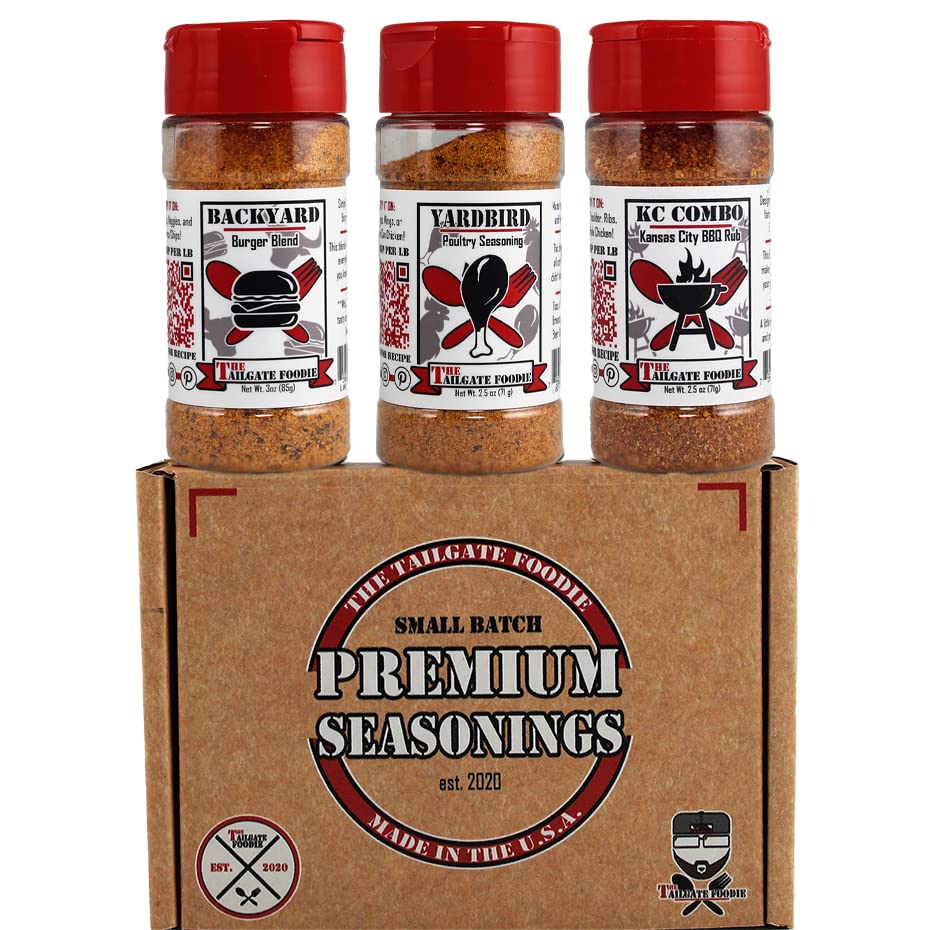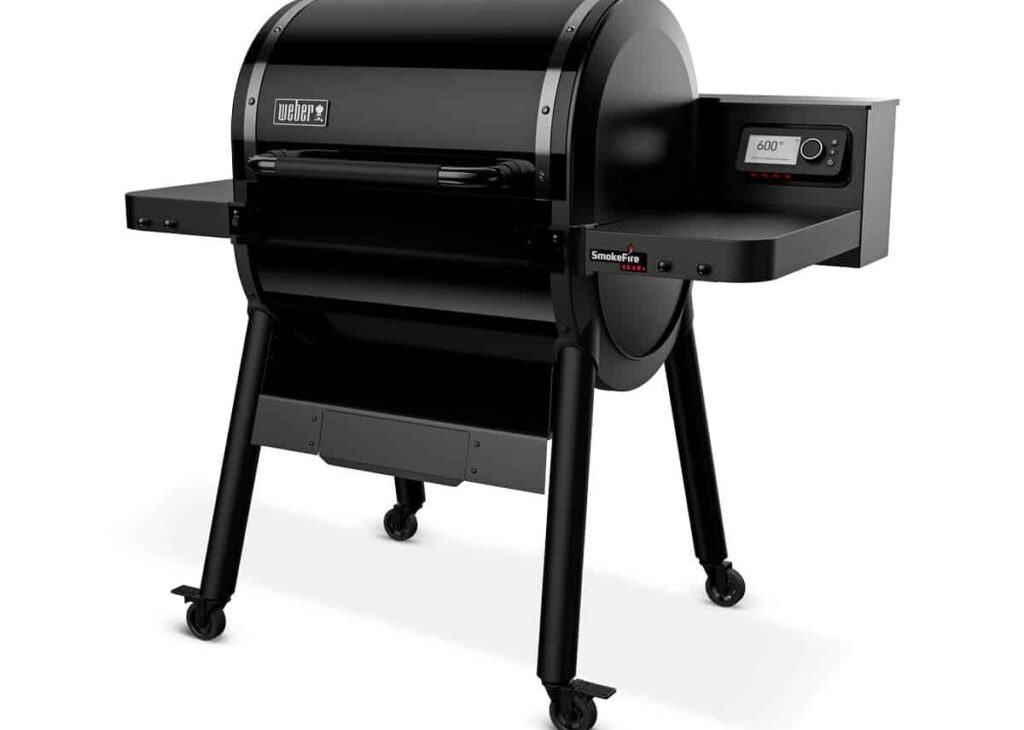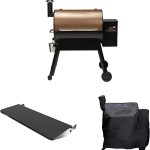Your grill smokes excessively due to grease buildup and high heat, causing it to burn off and create smoke. Grills can emit excessive smoke for a variety of reasons, but one common cause is the buildup of grease.
When you cook on the grill, fat and oil from the food can drip down onto the hot coals or burner, resulting in smoke. Additionally, if your grill is not properly cleaned and maintained, leftover grease can accumulate and contribute to smoke production.
Another factor that can cause excessive smoke is using high heat to cook. If the grill is too hot, it can cause the food to burn, leading to smoke. To reduce the amount of smoke your grill produces, make sure to clean it regularly and adjust the heat settings to a lower temperature.

Credit: www.amazon.com
1. Understanding The Causes Of Excessive Grill Smoke
Excessive grill smoke can be attributed to a few causes, and understanding them is key. One common culprit is a buildup of grease on the grill grates, which can result in smoke when heated. Another factor is excess oil or fat drippings, as they can create smoke when they come into contact with the hot grill surface.
Poor airflow or ventilation in the grill can also lead to excessive smoke, as the smoke doesn’t have a proper escape route. Additionally, using the wrong type of fuel can cause smoke, as certain fuels may produce more smoke than others.
Lastly, if the grill temperature is too high, it can result in smoke production. Taking these factors into consideration can help address the issue of excess smoke when grilling.
2. Cleaning And Maintenance Tips To Reduce Smoke
To reduce smoke while grilling, it is crucial to clean the grill grates thoroughly. Regularly scrubbing them will eliminate grease buildup, which is a primary cause of excess smoke. Additionally, make sure to clean the grease tray and drip pan regularly to prevent any clogs or backlog of grease.
Another important aspect is checking and cleaning the burner tubes and vents, as they can also be potential sources of smoke. Use a grill brush to remove any food particles and residue that may have accumulated on the grill. By following these cleaning and maintenance tips, you can significantly reduce the amount of smoke produced by your grill, allowing for a more enjoyable and efficient grilling experience.
3. Adjusting Grilling Techniques For Less Smoke
Grilling enthusiasts often wonder why their grill emits excessive smoke. One effective way to minimize smoke production is by preheating the grill for a minimum of 15 minutes. This ensures that the grill reaches the optimal temperature before cooking. Another technique is to use indirect heat when grilling fatty cuts of meat.
By positioning the meat away from direct flames, you reduce the chances of fat dripping and causing flare-ups. Additionally, trimming excess fat from the meat prior to grilling can prevent excessive smoke. Lastly, closing the grill lid while cooking helps regulate airflow and reduces the likelihood of flare-ups.
Adjusting your grilling techniques based on these tips can significantly decrease smoke production on your grill.
4. Choosing The Right Fuel For Your Grill
Grills can produce excessive smoke due to various factors. Choosing the right fuel is crucial. Opting for hardwood charcoal over briquettes can significantly reduce smoke. Natural gas or propane is a cleaner-burning option. Avoid using lighter fluid or self-igniting charcoal, as these can create more smoke.
Experimenting with flavored wood chips can enhance the smokiness of your grilled food. By following these suggestions, you can decrease the amount of smoke produced by your grill and enjoy a more pleasant grilling experience.
5. Troubleshooting Common Grill Smoke Issues
Grill smoke can be a common issue that may arise when using your grill. To troubleshoot this problem, start by checking for any gas leaks in your propane grill. Next, ensure that the air vents are adjusted properly to allow for adequate ventilation.
Additionally, make sure that the grill chimney is clear of any obstructions that may be causing excessive smoke. If these steps do not resolve the issue, it may be necessary to replace faulty burner elements or gas lines. By addressing these common grill smoke issues, you can enjoy a smoke-free grilling experience and delicious meals.
Remember to always prioritize safety when working with grills and propane.
6. Enhancing Grill Performance With Accessories
Enhancing your grill performance is essential to address the issue of excessive smoke. One way to improve it is by utilizing a grill mat that catches drippings, preventing flare-ups. Another useful accessory is a smoker box, which allows for controlled smoke infusion.
Investing in a grill cover is also crucial to protect your grill from weather elements. Lastly, installing an air vent fan can significantly enhance airflow, reducing smoke production. By following these tips and using the right accessories, you can minimize smoke and improve the overall performance of your grill.
Enjoy a smoke-free grilling experience!
Frequently Asked Questions Of Why Does My Grill Smoke So Much
Why Does My Grill Produce Excessive Smoke?
Excessive smoke from your grill could be caused by grease buildup, a dirty grill, or using the wrong type of fuel. Cleaning your grill regularly, removing excess grease, and using the correct fuel can help reduce smoke production.
What Causes My Grill To Smoke When Starting It?
When starting your grill, the ignition process may cause smoke due to the fuel igniting. This is normal and should dissipate once the grill reaches the desired temperature. Ensure you are using the recommended fuel and allow the grill to preheat before adding food.
Why Does My Grill Smoke When Cooking Fatty Foods?
Grilling fatty foods like meat can cause smoke due to dripping fat. The fat drips onto the heat source, causing flare-ups and smoke. To reduce smoke, trim excess fat from meats or use a
drip pan to catch the drippings.
How Can I Reduce Smoke While Grilling?
To reduce smoke while grilling, ensure your grill is clean and free of excessive grease. Avoid using too much fuel, as this can lead to smoke production. Additionally, consider using indirect grilling methods or a drip pan to catch fat drippings.
Is It Normal For My Grill To Emit Some Smoke During Cooking?
Yes, it is normal for a grill to emit some smoke during cooking, especially when grilling fatty foods. However, excessive smoke may indicate a problem, such as a buildup of grease or using the wrong type of fuel. Regular maintenance and proper grilling techniques can minimize smoke production.
Conclusion
To summarize, excessive smoke coming from your grill can be due to several reasons. First, make sure you’re using the right type and amount of fuel, as too much or improper fuel can create excess smoke. Next, ensure your grill is properly cleaned and maintained, as grease and debris build-up can lead to smoke.
Additionally, check for obstructions in the vents or air intakes, as inadequate airflow can cause smoke. Finally, keep in mind that weather conditions can also affect smoke production, so consider adjusting your grilling techniques accordingly. By addressing these factors, you can reduce the excessive smoke coming from your grill and enjoy a more pleasant and efficient grilling experience.
Remember to always prioritize safety and follow manufacturer’s instructions for optimal performance. Happy grilling!

Freda is a passionate foodie and kitchen gadget enthusiast. With over 10 years of experience in the culinary industry, Freda brings her expertise in testing and reviewing kitchen gadgets.





